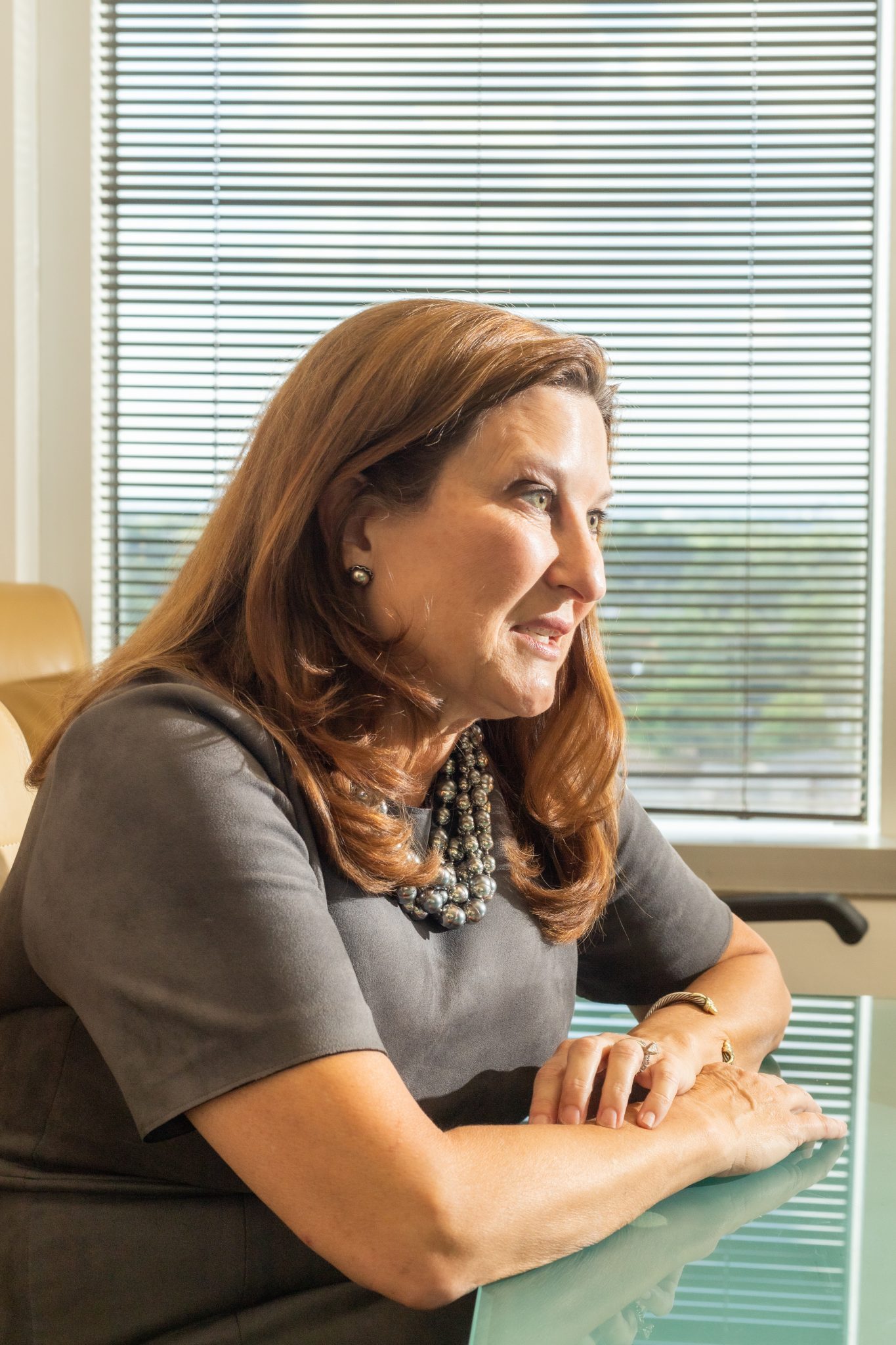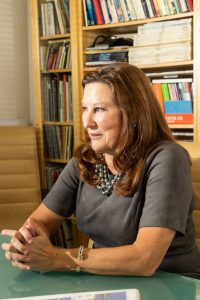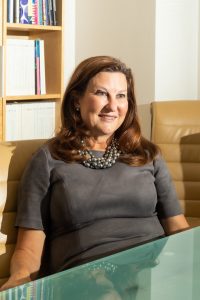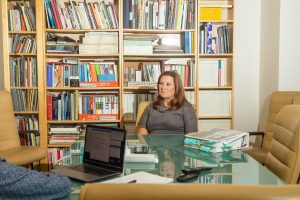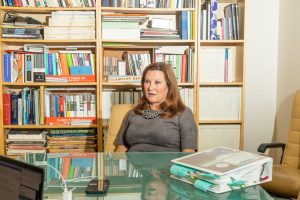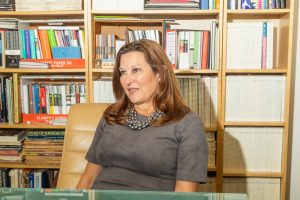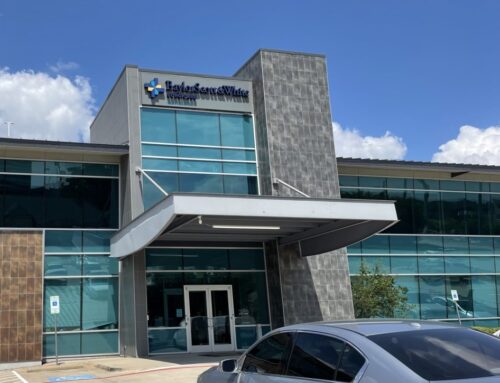Preston Center. Streets and Alleys. Dallas ISD. Vickery Meadow. Conrad High School. Homelessness. Crime. Being a council member.
Learn about all of these topics and more in this transcribed interview with Gay Donnell Willis, District 13’s new Dallas City Council member.
Willis has lived in Preston Hollow since 2002, and she has spent the past few months acclimating to her new position as a council member.
The Advocate sat down with her in a far-ranging discussion Aug. 16, 2021, to review goals for the district and the city, talk about her first impressions as a council member and understand more about how she plans to make decisions and gather neighborhood input.
This discussion, with questions asked by the Advocate’s Rick Wamre and Jessica Turner, was transcribed and lightly edited to clarify meaning and length but otherwise reflects the entire conversation.
How did you wind up living in Preston Hollow?
Gosh, I was born in Dallas and raised in Fort Worth … I just I went to Texas Tech, moved back to Dallas and actually lived on Victor (Street in East Dallas) for a while. Then I was married, starting a family and wanted space and trees and good neighborhoods and that sort of thing. So we just got plugged into Preston Hollow in 2002, and I was working at the time and had a lot of travel going on and it just didn’t work with being the mother of a toddler, so I ended up trading that professional life for big Junior League roles and president of the Preston Hollow Early Childhood PTA. I think that honestly, in the seat that I’m sitting in now, all of those types of experiences are just even more enriching and mean a lot more. I was the park liaison between two neighborhood groups and the City, so it’s just like this pathway has been finding me for a while.
I knew your son was going to Conrad High School, a Dallas ISD school in Vickery Meadow. I didn’t realize he graduated. There aren’t a lot of Preston Hollow people who send their kids Conrad from what I can tell. True or false? How did you come to that decision?
My son just graduated from Conrad High School. We chose Conrad because of the early college program. He graduated in June from high school, and he got an Associates of Applied Science degree from Dallas College in software development. He’s going to Austin College. I take him on Friday (August 20, 2021). We’re both ready.
(That decision to attend Conrad) was really driven by the DISD Choice Schools program. You know, when I grew up in Fort Worth, I went to private school through eighth grade and went to a public high school. So this wasn’t an unusual model in my life. My son had gone to Lamplighter, Greenhill and Winston. We were at a crossroads as he started high school, and we’re just thinking about what’s a path for him that he would engage in — school was not his favorite. And because of my friendships with different (Dallas ISD) trustees, and I was part of the inaugural Leadership ISD class. So I was aware of choice schools. And that’s why I’m a big ambassador for choice schools.
So I started researching it and found that was something he was interested in, very interested in computers. So we went over for an interview, because you have to go through an interview process, and they offered him a spot — on the spot. And so we talked about it and decided that would be a move we would make. And you know, it’s not easy starting college classes when you’re a freshman. But this is only the second year of this cohort. They’ve also got a health pathway because Dr. Emmett Conrad, I think, was the first African-American physician at Parkland. So they’ve kept that history, which I love, but every DISD high school has an early college program and numerous other ones. In fact, this morning, I was with Dr. (Edwin) Flores, at E.D. Walker that now has the Prestonwood Montessori campus, new construction, amazing classroom. And Dr. (Michael) Hinojosa stopped by the visit, and he was blown away by this classroom, too. On the campaign trail, people would always ask me: Are you sure you’re not running for DISD Trustee? I’m a DISD Mom, and I believe in the progress that’s been made. I mean, this is our community. So I really wish others would have more interest in what’s going on and update their critique from the past about what’s really going on in our schools.
As a parent, you deal with other parents. And with some Dallas parents, there’s no way they would send their kid to a public school. As a parent, you would get some blowback: Hey, what are you doing? Did you hear that kind of thing based on your decision?
I didn’t really hear that kind of thing. I think people are a little bit curious about it. You know, I think that feels like you’re taking a big gamble. But I’ve had experience in public and private schools in Dallas now. And I was curious myself as a parent: What kind of gap will there be in communications? What kind of gap will there be in other areas and parental involvement? It’s actually pretty good. Parental involvement, that’s tricky. Conrad was (already) 11 years old, and I was part of the group that helped found a PTSA (Parent-Teacher-Student Association). So yeah, that just didn’t exist. I mean, it’s tough. You’ve got parents with language barriers, you’ve got shift work. I mean, the typical meeting times don’t work for everybody. So that made it more challenging, but it’s there, and it’s trying to get its legs under it
What can you as a city council member do to improve public education in Dallas?
I think be supportive in communicating where the school district is today and where it wants to go. I mean, you hear a lot of talk about workforce development. And if you don’t get that our school system is the genesis of our workforce development, then you’re really missing the boat on that. So we have to work closely together and understand where is Dallas going with regard to industry of the future. I know our I know DISD is looking at these things, but we have to be working together to be sure that we are not only creating citizens who care about their community and each other, but about how they’re going to fit into where Dallas is going. You know, some of the problems we have today around crime around homelessness, I mean, there are ways that we can get at this if we just think about our schoolchildren.
And even those who don’t have kids in the school system right now need to be aware of what we’ve got. And there’s been a lot of improvement made. But some of the more direct ways that we can affect the school system is through our libraries, and making sure that we have hours that will help a child get their homework done, if they don’t have access to WiFi, which is another initiative, the city is working on just broadband across the city taking some of those ARPA funds (American Rescue Plan Act of 2021, which sends federal stimulus money to cities) and investing there. So really closing the digital divide.
But that’s not today, right now. But that’s something that we can affect with regard to a safe place to study, having the materials that kids need, having staff that is knowledgeable and that can assist them. Homework help, that sort of thing. I mean, there are hotlines, you can call the libraries actually have a homework helper hotline that the kids can access. I think a lot of parents would really be glad to know about that one.
So part of it is communication about the resources we have. Because when you sit and talk with someone like Jo Giudice (director of libraries for the City), and she starts talking about programs, you just think: Oh my gosh, there’s a gap between what’s offered and what people know about. So that’s a way we can help. And then just making sure that they have the resources they need to help serve the community.
I always said, while I was on the friends of the Dallas Public Library board, and every year, you know, going before council to advocate for more materials, budget and more staff and more hours. You know, I thought we would never close our rec centers because people know people need those for gross motor skills. I always said the library is the rec center from the neck up. So you would never want to take that away. And we need that. I mean, there are ESL classes and GED classes. And in some areas, it’s really a place where community comes together. So that’s, that’s an important thing to nurture.
You mentioned crime and homelessness. So let’s talk about crime a little bit. How worried do you think Preston Hollow residents should be about crime?
I think they already are worried about it. Because even though it’s more prevalent in other parts of the city, it can still occur. It does occur closer to Preston Hollow. And I know you’re talking with me with regard to Preston Hollow Advocate, but District 13 also includes west of Webb Chapel and Vickery Meadow.
So it’s that convex barbell, I guess. There are issues at either end of the district that are of concern, (Dallas Police) Chief (Eddie) Garcia’s plan for violent crime is in its infancy, and I sit on the Public Safety Committee, and we just got a two-month report last week. And there’s a little movement in the right direction on that.
One thing I would really like for people to think differently about, and I’m working to communicate with them about, is really expanding our notion of what public safety is. Last year there was a lot of rhetoric, a lot of a lot of things flying around that just were not helpful in getting people to think about public safety as something a little more broad than just an officer with a gun.
Saturday morning, I hosted a neighborhood leaders brunch — this is your Crimewatch leaders, HOA presidents, folks from all the different groups. We had about 24 (people) turn out, and I held it at the Vickery Park Library because I want people to start coming over and seeing that wonderful resource that is available. So they’ll go back and tell people about it. But we had a couple of our neighborhood patrol officers come to the event because I always want them to meet folks and everybody to have their contact information. And as I was getting questions about the budget, when we talked about public safety, I was looking at the NPO officer and just said public safety is about more than a police officer and a gun. It’s about having a RIGHT Care (Rapid Integrated Group Healthcare Team) team (a City of Dallas program created in 2018 to better address the needs of the community when responding to 911 calls related to mental health issues) where you’ve got mental health professionals and a paramedic going out on some of these calls, because that’s what a situation dictates — a police officer doesn’t help as much in some of these situations.
And sometimes it’s about blight remediation, and it is about not creating or allowing to exist these scenarios where crime is going to proliferate. And as I’m looking around engaging with neighborhood leaders, I look at those officers, and they are just nodding, and I thought: That’s the litmus test I need. They are feeling a lot of weight.
If you recall, a few years ago (former Dallas police) Chief (David) Brown had said: We’re asking our cops to do too much. And that was, I think, part of the catalyst for RIGHT Care, which started with two test units and then went to five last year, and it’s going to 10. And it’s because it’s working, and it’s sending people to the right place versus jail, maybe you need to go to the Sobering Center, which is also part of this. Maybe you need to go to mental health unit where you can be cared for the right way versus the one-size-fits-all jail, which does not solve any problems.
So when those fellows were nodding their heads, like: Yes, yes, we need these things. That tells me when the rank and file is nodding their heads, because this is what they live every day, then we’re on the right track.
There aren’t many homeless issues in the core Preston Hollow area. I saw an encampment at Forest and Central awhile back, but that’s about it. What are your thoughts on homelessness in Preston Hollow?
Actually, there was one I just heard about over off Park Lane. I mean, there you are between these two amazing schools, the new Jill Stone Elementary and Conrad. And so I called it to the attention of our Office of Homeless Solutions. And they’ll send an outreach team to engage with people to see who they can get the right resources, at least to get it on the radar, because that’s not one I had heard about before.
You know, we had a presentation about an initiative to take a big bite out of the homeless situation, the sheltered and unsheltered population, a great partnership with other communities around Dallas that are willing to offer vouchers to help stand people up for a year so that they can have a roof over their head and get the wraparound services they need.
Because this is not a light switch. It’s really interesting, though, to hear how many people are ready to be stood up, who are housing ready, who just need that bridge? And maybe it’s financial, and maybe it’s a legal issue, you know, employment, so that we can help get at solving this issue.
However, we also have this infusion of ARPA funds. I believe Dallas is getting $322 million. We just got half of that in May, we’ll get the other half next May. So the question becomes: What is the best way to spend for that? Do we get this program, that sort of rapid rehousing around a large number of people, 2,700, which is not bad when you look at our universe, which I think because of COVID the count was really not accurate. But you know, that’s a little under half is my understanding, which is not bad, that helps you with what you’re talking about under bridges and encampments that you see? Or do we want to look at the model that has been successful in purchasing a hotel or if you’re familiar with the St. Jude’s initiative (a Catholic Covid/Homeless Housing initiative at I-635 and Coit Road) has been helpful in getting a roof overhead and services to help get people back on a path to taking care of themselves and feeling productive and contributing to society.
So that is something that’s before Council that we will need to parse out: Which way do we want to go? Is it a hybrid? You know, we’re not sure, we’re still learning about that. And I’m not sure exactly where I fall because I don’t have all the information I’d like to have about that.
What is the single biggest problem facing Preston Hollow?
You know, beyond the hot button issues of public safety and concerns around homelessness, it goes back to the thing I’m hearing most frequently about streets and alleys.
So this is quality of life. I mean, quality of life is not necessarily the theater and museums and beautiful parks. It’s are you rattling your fillings loose as you drive down the street just to go to work or the grocery store. So I think there is now a program, however, I don’t think there has always been a really great program in place to take care of a street, once we create something, they tend to just deteriorate. Now, there’s a program in place that’s kind of like the oil change in your car so you don’t burn out the engine before you decide to go get a new car, you actually take care of the street along the way.
This is something that I hear about frequently: Why is that street being taken care of when mine is in such worse shape? And oftentimes, it’s because part of the program is about maintaining what we have, and part is about, you’re on a list for a very expensive reconstruction. So there’s a balance, but people know what they see. And it doesn’t always make sense to them. And when you explain it to them, sometimes it makes sense, but they still don’t like it. But you know, there is a program in place that I think can help get at this.
And the city manager (T.C. Broadnax) presented this year’s budget as an investment budget, which is something in speaking with him and our CFO (Elizabeth Reich) and speaking with the mayor (Eric Johnson) early on. That’s something I stressed — that infrastructure just tends to get passed along and passed along and passed along, we hold it steady, but that we’ve got investment that needs to be made.
People don’t think of Preston Hollow as having impassable alleys and awful street conditions, but it exists. And really throughout the district, when you block off your alley, and it can’t be used, and people have to put their trash receptacles out front, and then they get left in the street until you pull them back in again. I mean, that creates a traffic hazard. So it’s very frustrating. And I mean, this gets under people’s skin, and rightly so. So even though it’s not too sexy to talk about that, it’s very necessary. And I’m pleased to see the investment that we want to put in this. I also am inclined to think that ARPA funds, kind of like the New Deal, should be something that we can see them in 20-30-40 years still at work in our community.
One of the things you mentioned in the campaign was growing the tax base. You probably saw the initial U.S. Census numbers that came out showing Dallas is not growing much, or at least not as quickly as the suburbs and some of the other areas around here. Did that change your thought process about how we can grow the tax base or what we can do differently?
Not necessarily, because our new economic development policy has a real focus on south of I-30, because there’s so much opportunity there for residential and commercial. And in talking to Dr. J. — Dr. Eric Johnson — it’s my understanding that there are there are those who would be very interested in that part of Dallas with regard to its proximity to UNT Dallas.
You know, there’s some infrastructure that’s needed there. So who’s going to pay for that? Do we incent by creating that, or is there a way that we can get others who want to locate to Dallas to fund some of that? For us, it may be different in every case; I don’t know. But I think, for a number of reasons, that is one big open territory that offers great potential, it also will help us bring opportunity that should have had opportunity years ago. So now is the time,
I don’t think we should lessen our focus on growing that tax base, because these ARPA funds are going to help us a lot in the next couple of years, but then they’re going to go away. And we’re still going to have our needs and expectations. And you know, certainly we don’t want to raise taxes. This calls for lowering the tax rate ever so slightly, which I’d like to work on that and see if we can, can offer a little bit better reduction. And that I’m early in figuring that out or working on figuring that out.
But there are also opportunities within the district. And I think what we need is, “vision” is kind of the headline. You’ve got Vickery Meadow, you have the Preston Road and Northwest Highway area, you also have Marsh and Walnut Hill that was destroyed in the tornado. So there are opportunities in each of these areas to take a step back and look at an overall vision. You have a lot of property owners who are very interested in their own assets. And rightly so.
I think in this chair, it’s looking at the interests of the City of Dallas, which is also an investor in each of these areas. And you’re taking a lead on what that becomes. I mean, these are 50-year decisions or greater. So there are those who kind of like to push ahead in one way or another, to look at growth in pockets, but I think we need to step back and look at it from a bigger picture of: Who’s going to live here? What are the jobs in this area going to be like? What can you do for entertainment? What does life look like? What do we want it to look like in the next 10-20-30-40 years? And also involving the right partners? You know, sometimes I’m learning that there are some folks who haven’t necessarily been involved, and I want to be sure we pull the right people to the table.
I mean, we can’t not think about the school district and its role or the county and its role or some of our nonprofit partners. I’m sure it can be some sticky discussions at times, but better to go on and have them.
If you had to pick one reason why Dallas hasn’t been growing as fast as the other areas, what would it be?
Well, it’s not as easy to do business here as it should be. Today is the first day that our new Executive in Residence (William G. Mundinger II) starts to work on the (development) permitting issue. And I think it’s something that can be untangled. And that is part of what’s pushing business out. I mean, on the campaign trail, I would knock on a door, and every once in awhile, get a developer who’s just like: “I build houses in Lucas and Anna and Melissa now. You know, I want to work in Dallas, but it is so frustrating, I just not going to do it anymore.”
That’s wrong. And we know that’s an issue. And there is tremendous urgency on the resolution of that. And that is something that is being looked at in the budget. Last year, I think there were private options on the residential side to help reduce the backlog. So that was a temporary measure. So what’s the real deal? What do we need to be doing to get this right? Apparently (the permitting process) used to work pretty well. So not sure what happened here, but we need to fix it and have a pathway that’s sustainable so we can get back on track and not alienate the very people who want to do business here.
So you don’t think it’s anything systemic? You’re saying it’s more procedural?
I think it’s systemic too. I mean, it’s change. You’re always going to have a segment (of City employees) that is not understanding why we need change, not open to change, don’t see how they fit in the change. And we’ll have to work with the city manager to make sure that this message of being responsive, having good customer service, not letting things get bogged down, is not part of how we operate. And that there’s accountability on the back end of that. That’s what your private sector side will bring in.
You mentioned accountability. And I know only what I read in the Dallas Morning News about the backup data snafu, where the city “lost” 22 terabytes of data. It sounds like an individual city employee messed that up. I’ve been in Dallas for a long time, and I don’t recall any public service workers ever being fired for the kind of thing that, in private business, you will get fired for doing. From what you know, is this a fire-able offense, or is that even on the table?
We are getting briefed on Wednesday. And I’m not sure what’s public, what has been sent out by the city manager. But I’m interested in understanding more of the facts, because right now, I haven’t had it all laid out for me. But I agree that what I’ve experienced in the private sector does not always seem to be happening in the public sector. So, of course, no,
That’s easy to say. But, of course, it hasn’t been happening for years here.
Well, I know. And I’m very curious about that. So I’ve been on the inside two whole months, and I’m an outsider on the inside, in a way. So I would be very curious about that. I mean, I’ve managed people I’ve hired and fired and, you know, it’s just a part of life I’ve known in the professional world. So I’m very interested in seeing the methodology of handling a situation like this.
On Preston Center, we mentioned it earlier in our discussion. In terms of overall development there, any thoughts about how that should go down in Preston Center or what should be happening there? And how are you going to manage the process differently than past city council members?
It goes back to vision. It’s not just about that garage. It’s not just about that intersection, or the Tollway or the through-traffic on Northwest highway. I mean, all of these issues are complex in their own right. So we shouldn’t look at them individually and in a silo. We need to understand them. And that’s something I’m working on doing: Understanding more in depth each of the aspects of this.
But again, what do we want this to be? There are a lot of people who have great desire to see the mobility around that area change, where you don’t have to always be in a car. There are some traffic issues, there are concerns about density. On the other hand, it’s a major intersection. And there’s an opportunity for growth there.
When you look at different shopping centers or entertainment centers around the city, you look at that (Preston Center), and it’s a time capsule.
So there’s tremendous opportunity. It’s just getting the vision of what it needs to be. And it is certainly on my mind.
Is there any way to come up with a plan, or direct a plan, that everyone’s going to be happy with in Preston Center?
Everyone will never be happy, as much as I would like that to be. And that’s because everyone’s going to have to take their dream, and then what’s pragmatic, and somewhere in the middle, we will strike the balance of what that will become. And this is not just property owners, its neighbors. So there are a lot of viewpoints to consider.
Why does anybody ever want to be a city council member? It seems like the most thankless job because you’re on the ground level with people and people’s problems on the ground level are…
Literally on the ground level, and they want to action. That’s true. There are a lot of phone calls about alleys and streets and trash pickup and, you know, just myriad concerns.
But it’s also pretty cool. Aviation. Mounted police. The nuts and bolts of pothole repair. I really love it. I like seeing how it fits together. I like the thought of being in a role of working with my fellow council members and the mayor, to just keep our city going in a forward direction with regard to our citizenry, what the quality of life is like here. That can balance out some of the other stuff.
You’ve only been doing this for a couple of months. What’s your biggest surprise that you didn’t expect the job to entail?
I knew there would be a volume of information across so many different categories. But the volume of volume — it can be staggering at times. But it’s one foot in front of the other. Trite as it may sound, it’s just: Tackle what’s on the plate while also keeping the eye on the horizon. So you know, there’s kind of this cross-thinking going on. But you have to you have to be rooted in the everyday as much as you are looking ahead on policy and that sort of thing.
So I’m still just going through my first round of committee meeting. So I’ve got Transportation and Infrastructure today, Public Safety last week and Economic Development the week before that, and Government Performance and Financial Management. I’m vice chair of that one. And I’ll be working with the chair, Cara Mendelsohn.
And you’re working full-time as a council member?
Oh, yes. Absolutely. And then some. This week is budget town hall meetings. So Monday through Wednesday, there’s one each night. We did a district survey to see about the timing and locations of these, and we’re going to be doing one with District 6, councilmember (Omar) Narvaez is at 11 o’clock in the morning at Walnut Hill. So it’s not all evening, I really wanted to reach out and see if 6 o’clock on a weeknight is the only time we can do this, or are there some times that would fit better with people’s work schedules or location-wise,
It kind of gets back to engagement of residents. What other ideas do you have? Or is it possible to get even half of the people engaged. I mean, based on 10% voting in Council elections, maybe it’s not…
Well, we’ll see. I’m also having one of my budget town halls in person one Wednesday at the Vickery Park Library. Again, it’s like I’m leading you into a different part of the district and giving you a reason to come over here.
But one thing I told this Saturday morning neighborhood group was that I am a true believer in peer-to-peer, neighbor-to-neighbor communication. People get inundated with emails and texts and messages all over the place. But when your neighbor is knowledgeable about a situation, I think arming them with the facts (helps) people not get spun up over misinformation. There are definitely people in each neighborhood who others look to for their opinion or because they know they’re thoughtful. And they respect their opinion because they research it, or they have communication with their council person or some other person knowledgeable about whatever the matter might be. And I thank them for their service and also for being that person in their neighborhood.
And I feel like it’s my duty to make sure they are armed with what’s going on so they can communicate that out to their neighbors. When you look around these little nuclei around the whole district are all of these different groups — it may be a crime watch here, and a neighborhood association here, and a neighborhood patrol here. But the commonality is that there’s a core group of people that others look to for their information.
Now, on the other hand, if you look at a bigger picture, one of the things I would love to do is take some of these wonderful plans that we invest in and work on enacting and giving our citizens the opportunity to learn more about them. I mean, we’ve just done an urban forest master plan, we’ve got the comprehensive Environment and Climate Action Plan, a mobility plan, our homeless initiative. Just offering some basic information about our city, and how problems are being tackled, and giving you the opportunity to ask questions of those who are involved in enacting plans or creating policy is something I very much want to do. So I’ve asked them to help me prioritize what those might be and what they think their neighborhoods would like to learn more about.
For the people reading this interview who want more information from you, or your office, what’s the best way for them to get it?
We’ll be doing at least a monthly email. That’s something I heard loud and clear that council member (Jennifer Staubach) Gates’ office did a great job on, and I want to continue that and our Facebook page. So those are two quick ways to get the word out. But I will also be communicating to the neighborhood leaders so that they can push it out through an email that folks might actually open because they feel like it has information on trash pickup or something else going on in the neighborhood. And then, of course, through channels such as yours.
Anything I didn’t ask you that you want to talk about?
That last piece was something that is really important to me about using our neighborhood groups to get information out neighbor-to-neighbor. There are some very strong, well-established groups in District 13. And there are others that are a little more fledgling or that would like to come about. And so I also asked them if they’d be willing to share best practices and kind of help us cultivate and bring up some of these other groups so that we can be even stronger across the district.
We mentioned Vickery Meadow earlier. Ideally, what should that neighborhood look like in 10 or 20 years, assuming that it needs to look like anything?
Well, you have an incredible confluence of education, transit, and there’s a there’s two DART rail stations, employment, you’ve got in a NorthPark (Shopping Center) that’s very close, Shops at Park Lane, you’ve got health care at Presby, which is also a source of employment, you’ve got the SoPac Trail, Fair Oaks Park, you’ve got all these wonderful components that anybody would be looking for in creating some kind of live-work-play space. There is a large community of refugees being placed there, so growth could mean some displacement, and that’s got many people (feeling) very uncomfortable.
I would love to strike a balance between how we preserve some affordable housing, while we also have the opportunity for workforce housing, to make it easier for police and teachers and administrative assistants, etc., to be able to live close to all of these great amenities. You know, there’s a (Vickery Meadow) Public Improvement District, and you know, they have a vision for the redevelopment of the area. And this is this is one of those areas where it needs a big vision and a balance. And I don’t have the answer for that right now. But there will be discussions around this.
You can reach Willis through her City Hall assistants, Claire Noble (claire.noble@dallascityhall.com) or Alexandra Heller-Relayze (alexandra.relayze@dallascityhall.com), or visit her City Hall website at City Council District 13 (dallascityhall.com).


